
As Magic players, I think we forget how great Wizards of the Coast is as a gaming company. We bicker about cards being banned, formats being unfair, and on and on. Wizards recently had a whole week on feedback. In those articles, we were given resources on how to contact them, advised on the best ways to write those letters, and lots of encouragement to give them feedback.
Stop reading this and try to think of another company who goes to such lengths to connect with their customers.
Take your time. This article isn’t going anywhere.
”with great power comes great responsibility”
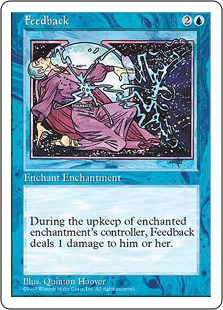
Wizards gave us an entire week on feedback. It is not my intention to add to the material provided. What I want to do today is to give some friendly advice: suggestions and tools to facilitate what you as a gamer feel the need to communicate. It is important to accurately portray what is felt and the logic behind it. I am not here to hinder any feelings or rants. A bad rant will have no effect and possibly the opposite outcome. A good rant will at least convey a point with sound logic in an elegant manner. However, I will encourage players to say thanks to the employees at Wizards.
Wizards is Not the Borg
Even though I don’t post on any of the forums anymore. Actually, it has been quite awhile. I do read a lot of the forum discussions and posts. Yup, I am a people watcher. Sit me down with a good vantage point at the Mall of America with a cup of coffee and I’m a happy camper. In truth, I find people fascinating. I wouldn’t say I like to analyze people. The sentence sounds like I am trying to break apart a person into pieces. Rather, I am trying to understand how and why people think the way they do. After my years of surfing the forums, one observation I find interesting is how players often relate to Wizards as some kind of Hive Mind. Generalizing that everybody at Wizards feels the same way about a certain topic is a mistake. Take our latest Mystical Tutor banning for the Legacy Format. I believe I can make the assumption not everyone at Wizards believed the card should be banned. Sure, a vote might have been taken with the majority banning the card, some other kind of hierarchy, or perhaps Gleemax just doesn’t like its flavor text. It is a mistake to generalize everyone at Wizards feels or thinks the same way.
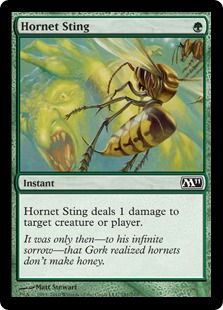
Another interesting aspect I have found is how often players associate the printing of a card equals 100 percent conviction. Just because a card got printed doesn’t equate the employees at Wizards weren’t hesitant about printing the card. I make choices everyday I am not entirely sure about. Sometimes I am torn on whether to get chips or a chocolate bar when I am at the gas station. Just because I chose the chips doesn’t mean I picked the high fattening snack with 100 percent conviction. I was more like 52 percent chips and 48 percent chocolate bar. Keep this in mind before clicking send on that angry letter. Maybe Wizards employees themselves were split on the printing of a certain card that later broke the format. They made a choice. I am also assuming that choice was made with the best intentions. They may also later regret that decision. Just like I did with those chips. They gave me some nasty heartburn.
Wizards employees are individuals and should be treated as such.
Double Reflections
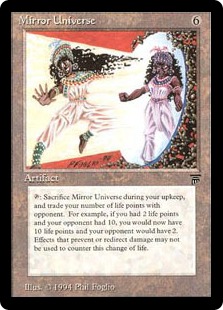
Take a client who comes into the office and says they are angry with their spouse. The counselor may repeat what they said, but instead replace angry with extremely infuriated. The client corrects the counselor by saying they are not that angry. Rather, the client is upset with their spouse. With further clarification, the client is actually only slightly upset. In a way, it is like playing devils advocate. The point is to help the client clarify their emotions and at the same time keeping the counselor from misleading the client. As a reader of this column, you can use this technique to more accurately portray your feelings in the letter you want to send Wizards. Don’t just write angry in your letter. Is anger really how you feel? Go through the emotional gauntlet. Be your own devils advocate, you may find those words you wrote aren’t entirely correct. You may actually just be disappointed or upset. Do I care you are going to send an angry letter to Wizards? No, but I do think players should accurate and honest with their feelings.
Due to unfortunate circumstances, I came upon a realization with my wife. When people ask how a person is doing, they commonly expect a single emotional response. It is a common perception people should feel only one emotion about an event. Why can’t it be more than one? I think it is a mistake for anybody and even counselors to focus on singular emotional response. Why can’t a person have multiple emotions towards an event? It relates well with comorbidity in the medical professional. Comorbidity has been pressed upon medical students of today with vigor. Basically, it means a patient can have more than one disease state. Too often, new medical students become so entrenched a patient must have one disease. It takes a while to impress upon them a patient can have multiple issues resulting in the observed symptoms. There is no reason why a person can’t have HIV, cancer, liver disease, and heart problems all at the same time. The same holds true of psychological disorders. A person can very well have schizophrenia, depression, and mental retardation. The same should hold true with emotions. On my wedding day, I was nervous, scared, happy, sad, excited, and worried. In relation to this article, Magic cards should be no different.
In a different sort of reflection, don’t spend five minutes on a long letter and click send. Take your time. If it is important, then the proper time and effort should be spent on the letter. A well thought out letter with proper grammar and sound logic might do wonders for you argument. Also, whoever you are sending it to will appreciate it more. Open up a word program and save it to the desktop. Then, mull it over for a day. When you wake up the next day, read it over. Do you still feel the same way? Does it make sense? Sending an email on an emotional bender does not benefit anyone. The receiver of the letter won’t be impressed and you might just regret it.
Context, Perception or Something Like It
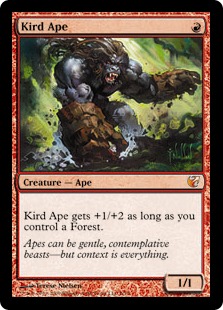
One day during the slow part of the afternoon, I got the chance to chat with a customer from Chicago. He had been up in the Twin Cities on business and had been heading home when he saw our interstate sign. On a whim, he stopped by to check it out. Let me tell you, the man had the time of his life. It might as well have been Christmas as he was as giddy as a little kid who just opened the best present ever from Santa. To be honest, the man was picking in some pretty poor areas and took him two hours to pick two pails. When the picking is good, it usually takes fifteen minutes to pick an ice cream pail. Was I going to tell him that? Heck, no. The man was as happy as a lark. Unfortunately, a regular customer was shopping in our little retail. That customer thought it was his duty to tell the man from Chicago how much of an idiot he was in his state of joy. Pretty soon, I had to intervene as the exchange became heated as they began informing each other the other was an idiot.
As a general rule, if somebody rolls in during the afternoon, I will find out if they have ever picked before. If the picking is somewhat poor, I will discourage the regulars and suggest they come back another day. First timers, I send right out to patch. I guarantee new customers will come back happy as can be. Oh right, this is supposed to be about Magic. The fact of the matter who the customer is very much influences how they perceive or experience a product. Somebody writes a letter to complain about a card such as the de facto Jace, the Mind Sculptor. Is the person a long time Magic player or somebody new to the game? If people just send an email saying they hate the planeswalker, the receiver only knows people hated the card. Giving the letter context allows the receiver to possibly come to the realization long time players love Jace, the Mind Sculptor while younger players tend to loathe card (just a theoretical example). This is why I think every letter to Wizards should convey this somehow. Even as I mention this I am cringing. I don’t want people writing a novel about their Magic history. I know I wouldn’t want to troll through hundreds of emails a day reading an entire page of a person’s Magic history (unless it is relevant to your point of discussion). All I think is needed is a little snippet: something short and concise. I think a short history after your name at the end of the letter would be adequate.
Sincerely,
Derrick Heard – Spike/Timmy
Invasion to Present
* Other descriptors could be casual, constructed, avid drafter for some suggestions.

Before sending that letter about a rant of hating something, write about something on the opposite end of the spectrum. What did you like? For example, you tell Wizards how much you hate Jace, the Mind Sculptor. In that same letter, tell them what kind of planeswalker you do like. I would suggest the same for most circumstances, but keep opposites in same category. It does me no good to ask a customer about their likes about apples then the customer tells me they hate potatoes. Umm…that doesn’t really help me. Hated a tournament, what did you like about the tournament? Don’t like new booster boxes, what booster boxes do you like? Don’t like a planeswalker, what kind of planewalkers do you like?
Also, it might help clarify your thinking and letter. Every argument should have a polar opposite. If the flip-side cannot be found, a flaw in the argument exists. Take a rant on how much a player hates Jace, the Mind Sculptor for instance. Okay, what is the opposite in your argument? Having problems finding an acceptable opposite. Maybe, it is because the argument is flawed. Searching a little deeper, a person doesn’t hate the card itself, but the financial cost to purchase the card through a vendor. Throwing out the cost aspect of the planeswalker, would you still hate the card? Hyperbole isn’t the always the greatest tool to argue a thought, but it can bring perspective to the debate/argument. Theoretically, lets say Jace was a common. Everyone in the Magic community has a playset of Jace. Would you still hate the card?
The Great Experiment
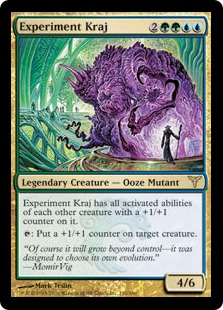
I interpret it terms of Wizards comfort level with a card. If Wizards really wanted to push direct damage in green, we would have saw more cards. We didn’t. Many sets/mechanics can be interpreted in terms of comfort levels. Let’s look at Sarkhan the Mad. Did we get an entire cycle of planewalkers with no plus ability? We got one. Sarkhan the Mad was an experiment/pilot. As players, I think we need to keep the grand experiment of Magic on the back of our minds. Especially, when we give Wizards feedback. Hornet Sting isn’t an attempt to destroy the color pie or Magic as we know it. It is a pilot card. Chill people. Don’t like the card? Sure, send Wizards your opinion. However, treating Hornet Sting (or any other card/set) as an absolute final decree by Wizards is a mistake. Rather, we should treat it in the spirit in which the card was printed: as an experiment.
Say Thanks
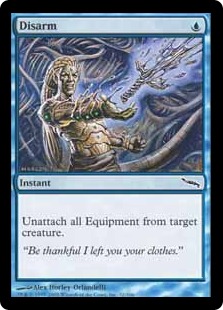
Until then, good luck, good game and good night.
Comments